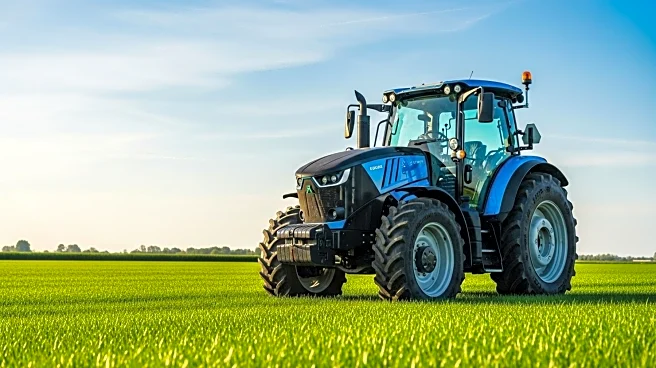What is the story about?
What's Happening?
At a recent pilot event, Michigan State University researchers showcased an electric tractor to farmers, highlighting its potential for sustainable agriculture. The electric tractor, designed for small farms, offers benefits such as reduced emissions, quiet operation, and compatibility with solar power. Farmers provided feedback on its performance, noting concerns about battery life and cost. The tractor is seen as ideal for tasks like weeding and navigating tight orchard rows. While the technology is still developing, it represents a step towards environmentally friendly farming practices, appealing to farmers interested in sustainability and reducing reliance on diesel.
Why It's Important?
Electric tractors could play a significant role in reducing agriculture's carbon footprint, as farming is a major source of climate-warming emissions. By offering a cleaner alternative to diesel-powered machinery, electric tractors support efforts to promote sustainable farming and environmental stewardship. The technology aligns with broader trends towards electrification and renewable energy, potentially transforming agricultural practices and enhancing marketability for farmers focused on sustainability. As the industry evolves, electric tractors may contribute to achieving climate goals and fostering innovation in agricultural technology.
What's Next?
Further development and testing of electric tractors will focus on improving battery life and addressing cost concerns. Researchers and companies may explore partnerships to advance the technology and expand its applications. The adoption of electric tractors will depend on overcoming structural obstacles, such as the availability of fast chargers and solar panels. As interest grows, stakeholders will need to address economic and logistical challenges to facilitate widespread use. The potential for automation and integration with other technologies may drive innovation in farming practices.
Beyond the Headlines
The shift towards electric tractors raises questions about the future of farming and its impact on rural communities. While offering environmental benefits, the transition may require changes in infrastructure and investment. The technology also highlights the potential for automation, with implications for labor markets and efficiency. Ethical considerations include ensuring equitable access to sustainable farming solutions and addressing potential disruptions to traditional practices. Long-term, electric tractors could redefine agricultural paradigms and contribute to a more sustainable and resilient food system.















